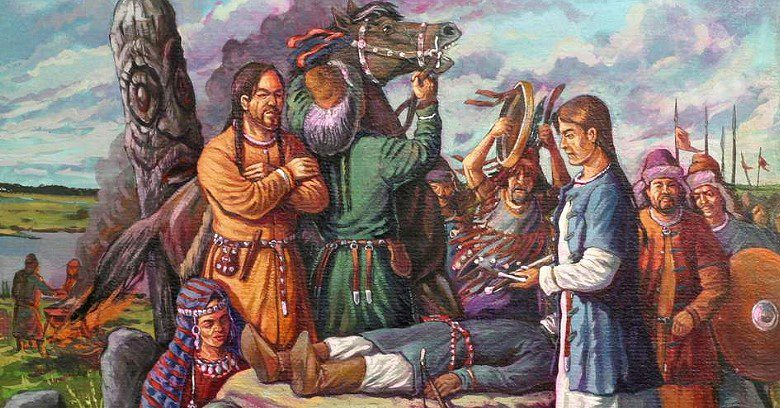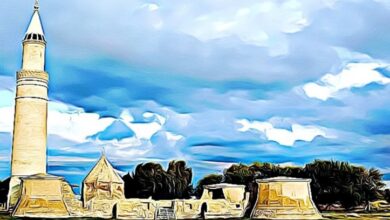
The legend of the "Teachings of Svyatoslav" about the beginning of the Danube Bulgaria
Authors: Begunov Yu.K., Nurutdinov F.G.-Kh.
DUnai Bulgaria (aka Ovech, Djurash, Mizia, Thrace) as a state and civilization arose in the 7th century. not in an empty place. It began from the Proto-Bulgarians, as the chronicle says, 17,000 years from the legendary Alp Lokbyr in the Urus-Sub or Kavyl (Northern Caspian region). Born by the will of the supreme god Tangra, the Great Bulgar subjugated Idel - the Urals, Agil (Balkans) and Balyn (Eastern Europe).
Before us is a series of ancient Proto-Bulgarian civilizations. But the most expensive of all is one: Danube Bulgaria. Much is told about it in the Bulgarian tarihi (chronicles) and nameya (poems) preserved in the Russian translation. One of them was discovered by the Bulgarian scientist Fargat Nurutdinov. These are the "Teachings of Svyatoslav", allegedly delivered by the Grand Duke of Kyiv on the eve of the Balkan campaign. The “Teachings” have been preserved as part of the “Bersal Tarihi”, i.e. "Pereyaslav Chronicle" of Bulgar origin, which, in turn, was part of the "Nariman Tarikha", XIV - XVIII centuries.
In the "Teachings ..." it was emphasized that under the Bulgarian Kan Kara - Saklan (Askyp, or Scythia, or Ukraine) Urus - Aidar (815-855) "we, the Uruses, began to have our own glory" in connection with the proclamation in 852 Russian beylik (principality) on the middle Dnieper with its capital in Kyiv. Then Dir (or As - Dzhir), the son of Mezimir (830-872), became the Russian prince. This fact was noted in the most general form in the Russian "Tale of Bygone Years", under 852: "... when Michael began to reign, the Russian land began to be called"; and the Bulgars called it Uruskala and considered it theirs.
It can never be forgotten that from the Bulgar root, among other things, grew the escape of the glorious tribe of the Rus, who lived in Kara-Saklan and Ak-Saklan (i.e. in Scythia, in the North Caucasus) and in Idel-Ural with ancient times of the Chernolesskaya archaeological culture is always next to the Bulymers-Bulgars with their brothers. And when wars came, the Rus, together with the Bulgar tribes, defended their land - Askyp, which spread over vast expanses from Altai to the Danube. The Tyur-Bulgars, or Kibya-Bulgars, roamed there, in other words, the dominant Bulgars, whom the Rus called Burdzhans. They took from other tribes (and according to Herodotus there were many of them in Scythia) tribute in the form of a tenth of grain and livestock. But they did not take anything from the Rus, because the Bulgars were honest and kind and lived according to the Torah, the ancient law. Russ called the Bulgars Khalibs, as evidenced by the ancient book "Prinikanie", they were friends with them, giving food and shelter when required, fought against the Greeks and Romans in the same Steppe Union, hated slavery and loved freedom. “And so it was until the wonderful bird Kungosh, aka Kukkosh, and Menkosh, flew to us, and sat on a tree and began to sing about the exploits of the ancient bakhadirs. Her feathers burned day and night, and the song called them to peace and to exploits, in a just war of light forces with dark divas at the head of warriors - majar with Alp Baryn (aka Barys, Kubar, Madzhar, Urus), galloping on a white horse through the air with a sparkling spear - lightning in his hand. And when Baryn cut through the clouds, then thunder rumbled, and living water flowed from heaven. And we drank this water with joy: after all, it gives us life and strength.
That wonderful warrior, the envoy of Tangra, is imprinted in stone in the form of a Madara horseman. Haijin sang it in poetry. So sang in the track-Bulgarian language Bek Haijin Musa Baltavarly, and in Russian darkness-cockroach prince Mstislav Vladimirovich, son of Vladimir I, grandson of Svyatoslav (years of life - 989-1036). For his poem, he used the "Teachings of Svyatoslav." They were written in Cyrillic letters on ancient tablets in the Agil (Balkan) language; a folklore legend about the Proto-Russians and Proto-Bulgarians from ancient times has been preserved here. At the beginning, it is told about Tangra and his deeds in the following words: “It is in vain to remember our happy times before a long journey, in vain to look back if the people know almost nothing about Naji (Underworld), Suvar (Heaven) and Jamyr (Earth, or the real world ), about the two sides of life - about Light and Darkness, about Good and Evil - and even hesitates to think about it. Tangra created Suvar, a Naji-cup from Jamyr (granite), which we call Jamyr Savyt and Djir (earth), Alps (spirits), Sun, Moon and Stars. Jamyr Savyt hung Tangra on the branches of Tyta, or Boy - Terek (Tree of the Universe), on which Jamyr Savyt has been hanging since that time. The Tija (Source of Life) pours out of the Suvar, giving birth to life by the will of Tangra. When the juice of Tiji in the living dries up, all living things die and fall into Naji, or Tammu (Underworld). And in Suvar there is eternal life, but only heroes and the righteous get there, whom Tangra turns into Alps after their death. Let the Uruses remember this Bulgar knowledge, for it will remain with us. In this I see our Kulai (Destiny)."
These are the foundations of the Bulgar spiritual teaching, which was also known to the Rus, but with other names. So Tangra is Dazhbog, the trinity of the universe - Yav, Nav and Rule, the goddess Umai - Mother Swa, etc.
And then follows an extensive narrative from the mythological history of the Proto-Bulgarians from the legendary Alp Lokbyr to the historical Khan Asparukh (VII century). As historical times reached, the voice of the preacher grew stronger, sounded more and more assertive, especially when it was told that the Proto-Bulgarians, led by the Barsyls (Borusks), with biy Seber, brother of Bulumar, at the head crossed from Idel on the Volga to the middle Dnieper ( or Tun - Burichai, in Bulgarian) and there "like falcons on swans on the Kryashians (Greeks) flew and beat them." When the Kryashians saw that the Fox (aka Shurale, Alp of Death) was already wagging his tail on the outskirts of Istanbul (Constantinople), they immediately sent their tribute to Seber in Djurash (Bulgarian Dobruja, or Ovech) - golden clothes and silver horses, and power they recognized the Bulgarian over themselves. "However, the Greeks gathered a large army and unexpectedly attacked Biy Seber." But the Bulgars were on the alert, continues the author of the Teachings, and such a massacre was staged for the enemies that the Kryashtsy quieted down for a long time. For these victories, our ancestors shed a lot of blood on that land, which means that it has become ours for us. Let us return there, Svyatoslav called, where we have already seen the Balkan mountains and the golden sands of the Lukomorye, we will help the Burdzhan Bulgars in the fight against the Kryash and sit forever in the Djurash of our ancestors.
In another place of his “Teachings”, Svyatoslav reports that the youngest son of Kubrat Asparukh with his Burdzhans (North Caucasians), Idel (Volga-Urals), Barsils (North Caucasian ancestors of the Rus) and Dulobai (Volyn) Bulgars with the help of Khakan Khazar Kyr - Bagyl (653 -675) defeated the Kryashians at the Sula (Danube) and took away from them the primordially Bulgarian lands: Kara-Burdzhan (Danubian Bulgaria) with the Dzhurash (Dobruja) region.
The "Instructions" clearly set out the program of the Balkan campaign of Svyatoslav: to establish the Bulgaro-Russian state as a result of the Balkan campaign of Svyatoslav Dzhurash, or Ovech, with its capital in the city of Pereyaslavets-on-the-Danube. Moreover, the author of the "Instructions" relies on the folklore Bulgar tradition of the gradual conquest of Agil, i.e. Balkan Peninsula. It is also based on the Bulgarian tradition of serving Tangra and its backgammon. Also sang the creator of the Bulgar epic "Chulman tolgau?" kan Kuban Boyan in 154 BC Khaidzhan sang like this: “The kryashtsy will leave the Djurash land, where milky rivers flow among the honey banks.” So, according to legend, the Rus were the closest friends of the Proto-Bulgarians, who professed a pagan faith in Tangra and its backgammons, and expanded their territory to Alan-Kubar (Odra River) and Istanbul (Tsargrad). They did not want the “children of darkness”, as the Bulgars called the Greeks, to fatten on the earth and enslave the Bulgars and Slavs.
Gradually, the author of the “Teachings” moves on to the time of the Asparukhov Bulgars, when “the Kryash Bagh of the Burdzhan Bulgars, the son of Kubrat Asparyk did not want to submit to them and left for the Burman steppe (Northern Black Sea region). There once Kermek, the son of Urusbag (Attila) and the ancestor of Kubrat and Aidar, ruled over his own Khon-Bulgars (Huns) (the years of the reign of Bel-Kermek, or Irnik - 463-489) “... wanting to take away part of Agil from the Greeks, Khan Asparuh, the son of Kubrat, asked for help from the Khon or Kermek Bulgars - Debers (Tivertsy) and coal miners (streets), as well as from the Barsyls (Borusks), the current Uruses, and Baryndzhars (Berendeys). They together sent their people to him, and for the first time he defeated Kryashkala (Greece) and reached Kichi-Kiya, or Kichi-Bersala (Small Pereyaslavets). Then those barsyls who did not want to enter Khazar and joined Asparyk settled in that Kichi-Kie. Although, I must say, while the Baryndjars owned Khazaria, they did not oppress us, they did not even take tribute from us, and we lived on Tun-Burichai as we wanted. But the Kryashtsy did not allow the Barsyls to live in peace in Kichi-Kiya: they hired Khudians (ready) and Kryashtsy (Greeks), and they attacked the Barsyls, the current Russ. When Asparuh again prepared for battle, he, together with the Barsyls, utterly defeated both the Khudians and the Kryashtsy. The enemy ran as fast as they could, but only a few managed to escape. As if with lightning, the Barsyls and other Asparyk Bulgars of the Khudians and Kryashians struck with lightning, and, as you know, they took half of Agil. The Khudians were frightened, left Agil somewhere to the north, and disappeared there. And the Asparykov barsyls settled near Djurash and, as it is said, the mercy of God was realized! We praise the Great Tangra and its Alps: Kubar Zheltousy, Saban the Strong, Alabuga the Good and others! And to this we add that since then our land has been Uruskala (Rus), for the blood of our ancestors watered it abundantly! Then they took many of our captives, but after that they labored for us and became free and equal to ours. The interesting text of the Teachings of Svyatoslav does not end there. The author mourns a lot about the loss of the former Bulgar power and unity. Now Uruskala and Bulgar are separated, they are divided into tribes and vegetate in a miserable existence one by one. And the Greeks, with the help of their faith, divide the nations, they are baptized and brought closer to themselves. This happened with the Danube Bulgars, and later with Rus. The Bulgarian-Russian geopolitics of the time of Svyatoslav the Brave could not win: it turned out to be a utopia, especially in the conditions of the Christianization of all of Europe. However, the glorious deeds of the Slavic-Bulgarian rulers from the dynasties Dulo, Rurikovich, and later the Asenians in their struggle for freedom and independence cannot be forgotten!

